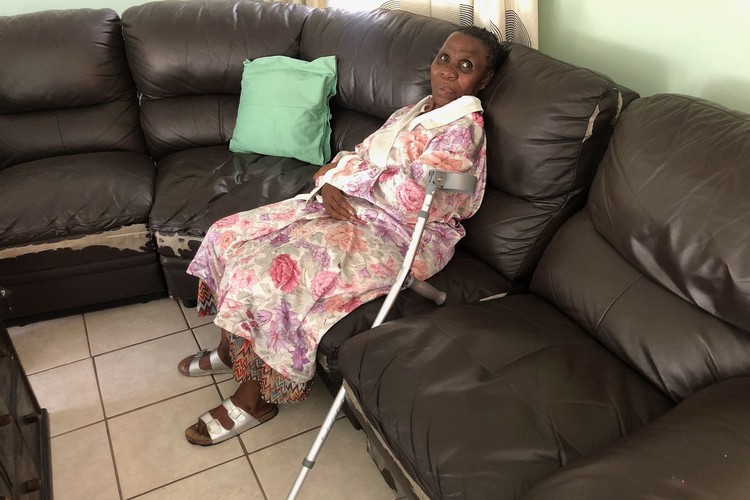
25 March 2024
Thobeka Faku, from Khayelitsha, says she is keen to vote and will find a way to get to her voting station on 29 May. Photo: Mary-Anne Gontsana
Thobeka Faku, 73, is eager to vote in this year’s General Elections on 29 May. But she has limited mobility after a debilitating fall a few years ago. She uses crutches, but her legs still can’t support her for more than a few minutes.
Her voting station is at a school in H-Section, Khayelitsha, not far from her home, but too far for her to walk.
“Voting is very important. The one thing that I want my vote to contribute to is the end of unemployment,” she said. “I am just worried that I will not be able to go to the voting station because of how weak my legs are. I don’t have a wheelchair. I might have to ask some people to accompany me.”
Faku’s nephew, Sibongiseni, is part of Freedom To the Forgotten, an organisation promoting disability rights. He said they visited voting stations in Khayelitsha on registration days to educate voters living with disabilities. Their aim is to have people living with disabilities at the forefront of voter education.
“Do people with disabilities … know their options? Do they know about special voting? What is the IEC doing for people living with disabilities who will not be able to make it to the voting station on 29 May? Those are the kinds of questions that we need to ask and get answers to, that we can relay to others,” said Sibongiseni.
Provincial electoral officer Michael Hendrickse said the IEC in the Western Cape works with many organisations that represent people with disabilities. He explained the steps the IEC has taken to help make voting possible for people with disabilities.
“Together with the South African National Council for the Blind (SANCB), we have developed a voting aid called the Universal Ballot Template (or UBT for short) to assist people with disabilities and special needs to vote in secret during elections,” said Hendrickse.
According to the IEC website, the template is a voting aid made of hard black plastic into which a ballot paper is inserted. The template is however not a braille ballot paper. The right front of the template has a flap with cut-out windows numbered in braille and large raised white print. When the ballot paper is inserted into the template, each window aligns to the particular candidate or party and the voter is free to make their mark independently.
All voting stations are supposed to have this voting aid.
Hendrickse explained that electoral legislation allows for a person who requires assistance due to physical disability to be assisted by another person who is 18 years or older and not an agent of any party or independent candidate.
“In such cases, the presiding officer will issue the voter with the ballot papers and the voter with their assistant will enter the booth alone, where the assistant will assist the voter.”
“At no stage in this process will any IEC official or agents be present in the voting booth. Agents will only be present if a voter asks the presiding officer to assist with the voting,” said Hendrickse.
Yanga Dyantyi, who is blind, said that when she went to register to vote in Khayelitsha she found the process smooth. The people working at the registration point were helpful and friendly.
“I think the only thing that I can say is that we need more education and awareness regarding the voting process and especially the promotion of the special vote option. And we have to keep in mind that not all blind people can read braille,” said Dyantyi.
The IEC’s website says that the Universal Ballot Template is also aimed at assisting people who are dyslexic, people with low literacy, and people with “motor and nervous conditions which do not allow for a steady hand”.
Hendrickse also explained that voters in hospitals or old-age facilities can apply for a special vote. This voting takes place on 27 and 28 May, before the main election.
It is the voter’s responsibility to apply for a special vote, and to arrange with their facility to make the necessary arrangements, explained Hendrickse.
You can start applying for a special vote from 15 April. Applications must be in by 5pm on 3 May.
For a home or institution visit, you can apply online at www.elections.org.za or by handing in an application form at your local IEC office. An IEC official will, on 27 or 28 May, visit the address that you have given on your application form.
If a voting station is not wheelchair accessible, the IEC assured us they will take steps to assist people using wheelchairs to vote.